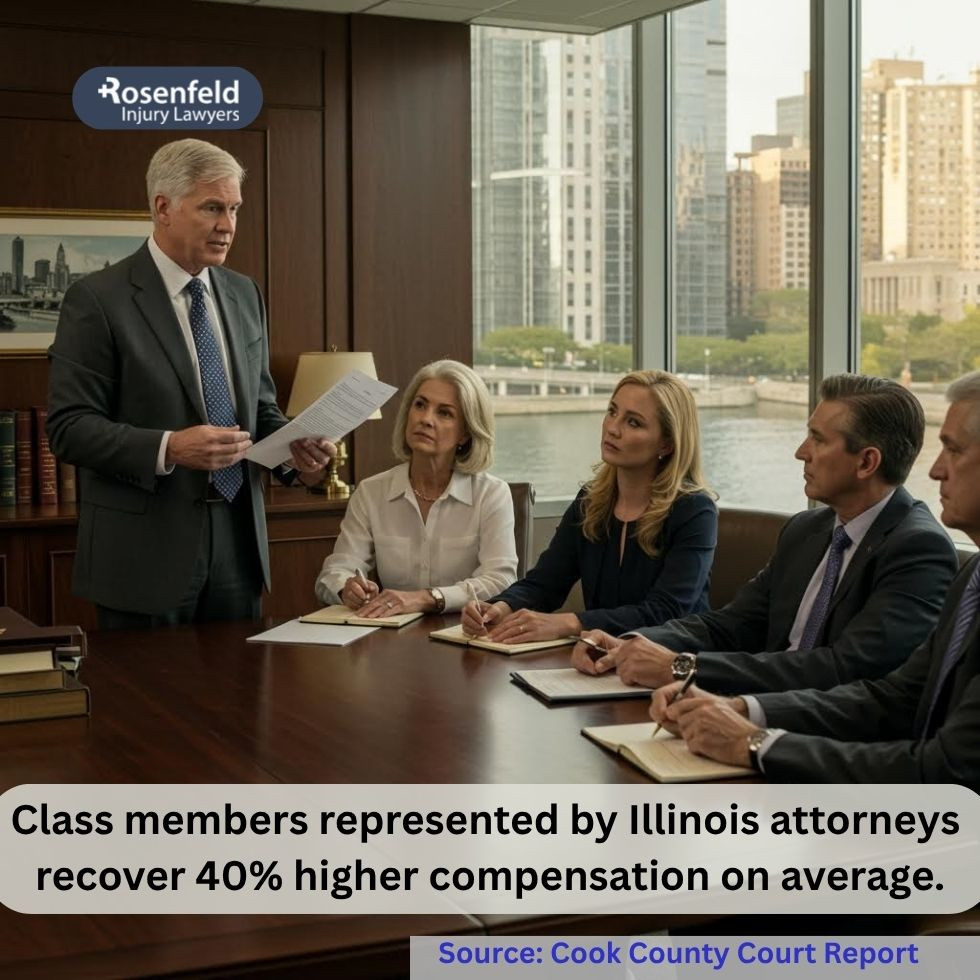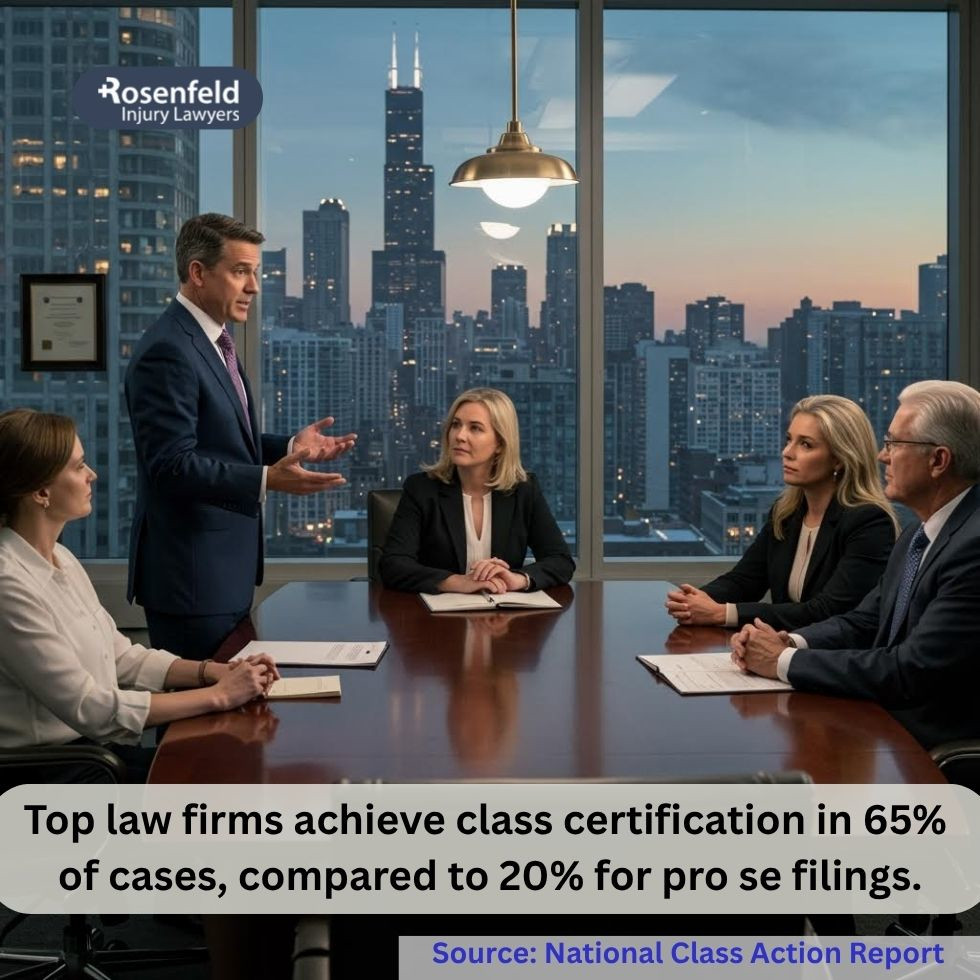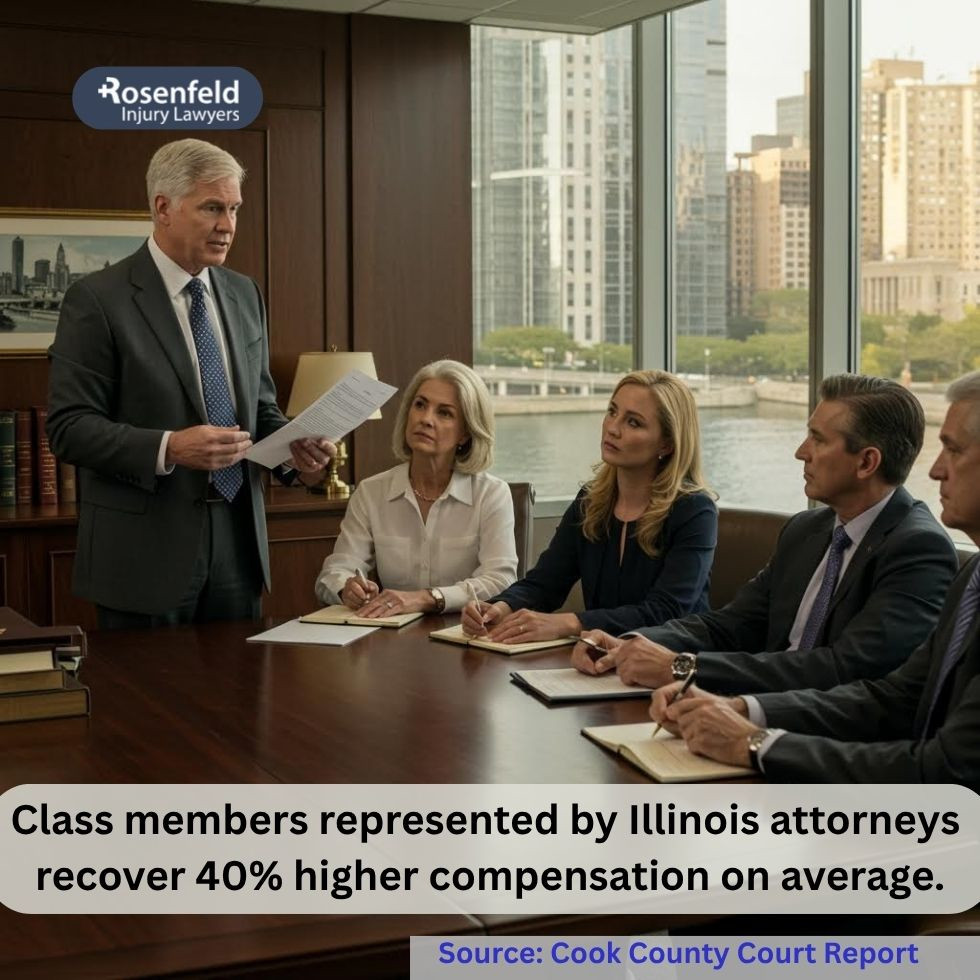- 24/7 Free Consultation: (888) 424-5757 Tap Here To Call Us
How to File a Class Action Lawsuit in Illinois
This page explains how to file a class action lawsuit, what to expect, and how an experienced attorney can help. Filing a class action lawsuit in Illinois allows a group of individuals with similar claims to take legal action together against the same defendant, often a large corporation or business.
These cases typically involve widespread harm, such as defective products, illegal business practices, or consumer fraud. Instead of each person filing separately, one or more plaintiffs file on behalf of the entire group.

What is a Class Action Lawsuit?
A class action lawsuit is a legal case brought by one or more individuals on behalf of a larger group who have suffered similar harm from the same defendant. Instead of filing dozens or hundreds of separate lawsuits, all claims are combined into a single case.
This type of lawsuit is often used when a large company’s actions, such as selling a defective product or engaging in unfair practices, affect many people in the same way. The group of affected individuals is called the “class.”
Why are Class Actions Important?
Class actions play an essential role in holding powerful entities accountable, especially when individual claims might be too small to justify separate lawsuits. They allow people with similar injuries to combine resources, making it more affordable and efficient to seek justice.
For society, class action lawsuits help enforce laws, expose harmful practices, and deter future misconduct by large corporations. They also promote fairness by ensuring that all affected individuals, no matter how minor the loss, can be part of one unified legal effort.

Determining if You Have a Valid Class Action Case
Before filing a class action lawsuit, it’s essential to determine whether your situation qualifies. Courts require specific criteria to be met before allowing a case to proceed as a class action.
These include having a large enough group of affected individuals, common legal or factual issues, a lead plaintiff whose experience reflects the group’s, and legal representation capable of protecting the interests of everyone involved. Meeting these standards is essential for class certification.
Numerosity: Is the Class Large Enough?
To qualify as a class action, there must be enough people affected that handling the claims individually would be impractical. While no fixed number is required, courts typically look for at least 20 to 40 plaintiffs with similar claims.
The exact number needed can vary depending on the facts of the case. The idea is that it’s more efficient and fair to resolve the dispute in one action rather than through numerous individual lawsuits.
Commonality: Are There Common Questions of Law or Fact?
A valid class action requires that all members share at least one legal or factual issue in common. This might include questions about whether a product was defective, a policy was discriminatory, or a company engaged in deceptive practices. The common question must be central to the case and capable of driving the outcome. Without this shared issue, a court is unlikely to allow the claims to proceed as a class.
Typicality: Are Your Claims Typical of the Class?
The lead plaintiff’s situation must closely resemble the experiences of other class members. This is known as typicality. It ensures the person representing the class has claims and legal arguments that are aligned with the rest of the group. If the representative’s case is too different or raises unique defenses, the court may decide it’s not appropriate for a class action. Typicality helps keep the focus on common claims and fair representation.
Adequacy: Can You and Your Attorneys Adequately Represent the Class?
Adequate representation is critical in class actions. Courts must be confident that the lead plaintiff and their legal team will act in the best interests of all class members. This means the plaintiff must have a genuine stake in the case and no conflicts with other class members.
The attorneys must also be experienced, well-prepared, and able to handle complex litigation. Inadequate representation could result in the court denying certification.

Types of Class Action Lawsuits in Illinois
Class action lawsuits in Illinois cover a wide range of legal issues where many plaintiffs are harmed by similar conduct. These cases often involve companies, employers, or institutions that engage in illegal, deceptive, or negligent behavior.
Whether it’s a defective product, a wage violation, or a data breach, class actions allow multiple victims to combine their efforts in one lawsuit, improving efficiency and increasing the chances of holding the responsible party accountable.
Consumer Protection Class Actions
Consumer class actions often target companies accused of deceptive or unfair practices. These may involve defective products, misleading advertising, hidden fees, or violations of Illinois consumer fraud laws.
When many people suffer the same type of harm from the same conduct, such as being sold a product that doesn’t work as advertised, a class action can offer a way to pursue fair compensation for all plaintiffs, even if each person’s financial loss was relatively small.
Securities Fraud Class Actions
Securities fraud class actions are brought by investors who claim they were misled about a company’s financial health or prospects. These cases typically involve misstatements or omissions in financial disclosures, which can artificially inflate stock prices.
When the truth comes out and stock values drop, investors suffer losses. Class actions allow shareholders with similar claims to pursue compensation without each having to file separate lawsuits, making it easier to hold corporations and executives accountable.
Employment Law Class Actions
Class actions in the workplace often involve wage and hour violations, such as unpaid overtime, off-the-clock work, or failure to provide meal breaks. Other common claims include workplace discrimination or unfair labor practices.
Employees who face the same issues, especially in large organizations, may file a class action to recover unpaid wages or seek justice for discriminatory conduct. These cases help ensure employers follow labor laws and treat workers fairly under state and federal law.
Antitrust Class Actions
Antitrust class actions target businesses engaged in illegal practices like price-fixing, market allocation, or monopolistic behavior that harms competition. These lawsuits are often filed by consumers or businesses forced to pay artificially high prices due to a lack of market competition. By bringing claims as a class, victims of anticompetitive conduct can share resources, increase pressure on the defendants, and seek compensation for losses that would be difficult to recover through individual suits.
Data Breach and Privacy Class Actions
Data breach and privacy class actions involve companies that fail to protect personal information. When sensitive data, such as Social Security numbers, medical records, or financial details, is exposed due to negligence or poor security, victims may face identity theft or economic harm. Class actions allow affected individuals to seek compensation and push companies to improve cybersecurity practices.

The Illinois Class Action Statute
Illinois class action lawsuits are governed by 735 ILCS 5/2-801, which outlines the specific requirements for bringing a class action in state court. This law ensures that cases involving groups with similar claims are handled fairly and efficiently. To move forward as a class, the case must meet several legal prerequisites, followed by a certification process. The statute also establishes rules for notifying class members and gives individuals the right to opt out if they prefer to pursue separate claims.
Prerequisites to a Class Action Under Illinois Law
Illinois law requires that a case meet four conditions to proceed as a class action.
First, numerosity—there must be enough people affected that individual lawsuits would be impractical.
Second, commonality—the group must share key legal or factual issues.
Third, typicality—the claims of the representative plaintiff must be typical of the class.
Fourth, adequacy—the lead plaintiff and their attorney must be able to fairly and effectively represent the interests of the entire group.
Class Certification Procedures in Illinois
To obtain class certification, the representative plaintiff must file a motion asking the court to certify the case as a class action. The court then reviews the four statutory prerequisites: numerosity, commonality, typicality, and adequacy.
Evidence supporting each element is often required. The judge evaluates whether a class action is the most appropriate and efficient way to resolve the claims. Certification is a key milestone in moving the case forward on behalf of all class members.
Notice Requirements to Class Members
Once a class is certified, Illinois law requires that class members be appropriately notified. The notice must inform them of the nature of the lawsuit, their right to participate or opt out, and what steps they need to take. Courts often approve the form and method of notice, which may include mail, email, or publication. The goal is to ensure that all affected individuals receive fair and reasonable notice so they can make informed decisions about their legal rights.
Opt-Out Rights of Class Members
Under Illinois law, individuals who are part of a certified class action generally have the right to opt out. This means they can remove themselves from the case and preserve the right to file their individual lawsuit. The notice sent to class members must clearly explain how and by what deadline someone can opt out. Those who do not opt out will be bound by any final judgment or settlement, even if they never actively participated in the case.
Steps to File a Class Action Lawsuit in Illinois
Filing a class action lawsuit in Illinois involves a multi-step legal process that requires strategic planning, strong evidence, and adherence to court rules. Whether your case involves consumer fraud, defective products, or employment violations, following the proper steps is essential to protect your rights and those of the entire class. From securing qualified legal counsel to serving notice on the defendants, every phase plays a critical role in launching a successful class action suit.
Consult with an Experienced Chicago Class Action Attorney
Before proceeding, it’s vital to consult with an attorney who understands class action litigation. These cases require a unique legal strategy and strict compliance with procedural rules.
An experienced class action lawyer in Chicago will assess whether your case meets the legal requirements and help you determine if state or federal court is appropriate. Legal representation also ensures that your complaint is drafted correctly, your rights are protected, and the lawsuit has the best chance of moving forward.
Investigate and Gather Evidence
Building a strong foundation for your class action begins with gathering detailed evidence. This includes reviewing records, documents, and communications that support the claim of widespread harm. Your attorney may also speak with potential witnesses, other affected individuals, or industry experts.
A thorough investigation helps establish commonality across class members and strengthens your position when seeking certification. Without solid evidence, the court may not approve the lawsuit to proceed as a class action.
Drafting the Class Action Complaint
The complaint is the formal document that starts your case. It must identify the class representative, the proposed class, the defendant(s), and the specific claims being brought. The complaint should include allegations of wrongful conduct, the facts supporting those claims, and a request for relief, such as compensation or corrective action. It must also explain why the case qualifies for class action status under Illinois law or federal rules, depending on the court.
Filing the Complaint in the Appropriate Court
Once the complaint is ready, it must be filed in the correct court—either Illinois state court or federal court. Jurisdiction is key. State courts are often used for cases involving violations of Illinois law, while federal courts may be appropriate when claims involve federal law or if the parties are from different states and damages exceed $5 million (under the Class Action Fairness Act). Filing includes paying the appropriate fees and submitting necessary forms.
Serving the Complaint on the Defendant(s)
After filing, the complaint must be formally served on each defendant, which is a legal requirement to inform them of the lawsuit. Service can be completed through personal delivery, certified mail, or via a professional process server, depending on court rules. Proper service ensures that the defendant has a chance to respond and that the case can proceed. Failing to serve properly may result in delays or even dismissal of the case.

The Class Certification Process
Class certification is a critical turning point in any class action lawsuit. To proceed as a group, the lead plaintiff must file a motion for certification, usually after some discovery is conducted to gather preliminary facts. This motion asks the court to officially recognize the case as a class action under the standards set by Illinois law or the Federal Rules of Civil Procedure.
The plaintiff must also submit a certification brief, which explains how the case meets legal requirements—namely, numerosity, commonality, typicality, and adequacy. This brief includes factual evidence, legal arguments, and often expert opinions to support certification.
At the certification hearing, both sides present arguments. Plaintiffs argue that the case should proceed on behalf of all similarly affected individuals, while defendants may try to show that individual differences make class treatment inappropriate.
After reviewing the arguments and evidence, the judge decides whether to certify the class. If granted, the lawsuit can proceed as a class action. If denied, plaintiffs may have to pursue individual lawsuits.
Notice to the Class and Opt-Out Procedures
Once a class is certified, the court will order that notice be sent to all identifiable class members. This notice must clearly explain the nature of the lawsuit, the rights of the class members, and the option to remain part of the class or to opt out.
The goal is to ensure that everyone potentially affected has a chance to make an informed decision. Class members who opt out retain the right to file their lawsuit, while the outcome binds those who stay in.
Discovery, Settlement, and Trial
After class certification, the case moves into the discovery phase, where both sides exchange evidence and take depositions to build their arguments. Many class action lawsuits resolve during this stage through a negotiated settlement, which the court must approve.
If no settlement is reached, the case proceeds to trial, where the class representatives present their claims on behalf of all members. A verdict in favor of the class can result in monetary compensation or injunctive relief for the group.
Contact Rosenfeld Injury Lawyers for Help With Your Illinois Class Action Case

If you believe you’ve been harmed as part of a larger group due to a company’s misconduct, you may have grounds to join or start a class action lawsuit. Rosenfeld Injury Lawyers offers free consultations to help you understand your rights and legal options. Our experienced class action attorneys are ready to evaluate your case and guide you through the following steps.
Call us at (888) 424–5757 or fill out our contact form to schedule your free, no-obligation consultation with a Chicago personal injury attorney.
All content undergoes thorough legal review by experienced attorneys, including Jonathan Rosenfeld. With 25 years of experience in personal injury law and over 100 years of combined legal expertise within our team, we ensure that every article is legally accurate, compliant, and reflects current legal standards.







